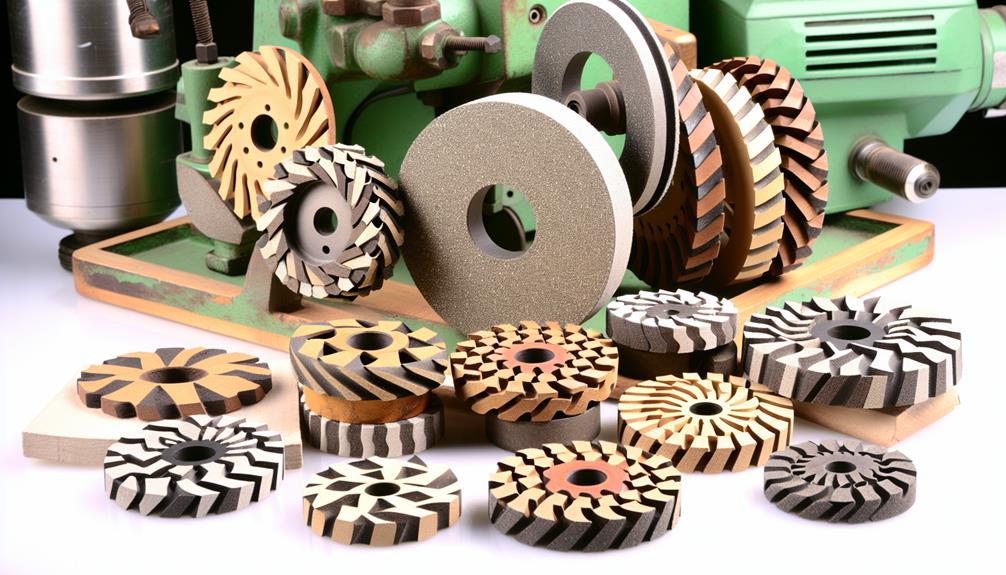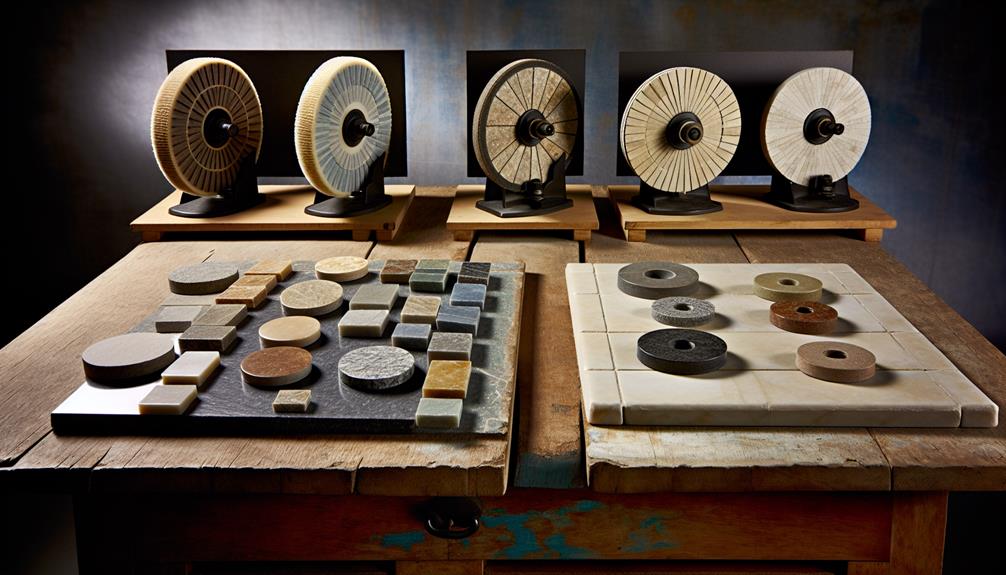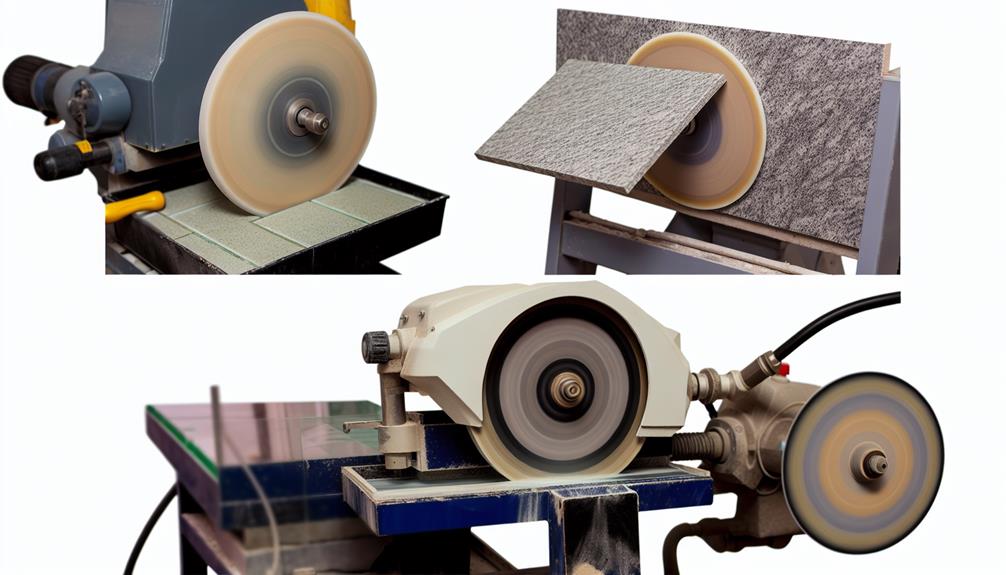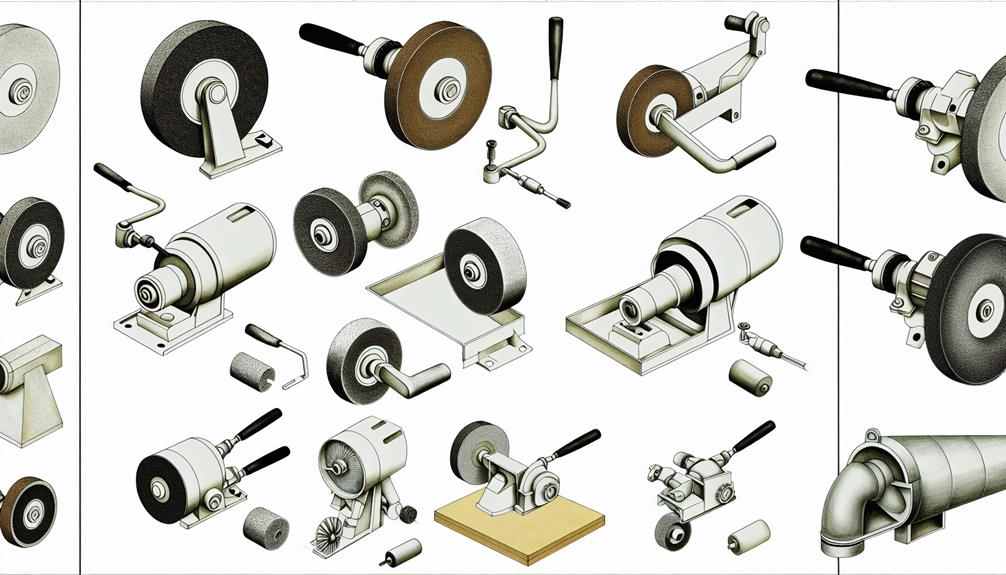In the realm of tile manufacturing, the adoption of dry squaring wheels marks a significant advancement in enhancing the efficiency and quality of tile finishing processes. These specialized tools, designed to operate without water, cater to a variety of tile types, each requiring a distinct approach to achieve optimal results. From precision edge finishing to achieving uniform surfaces, the capabilities of dry squaring wheels are manifold. However, the distinction between dry and wet squaring wheels raises important considerations regarding their respective efficiencies, costs, and outcomes. Exploring these differences not only highlights the technological innovation behind these tools but also underscores their strategic applications in the broader context of industrial manufacturing.

A dry squaring wheel is a specialized tool designed for precise dry squaring, chamfering, and micro-chamfering of ceramic and porcelain tiles. These tools are pivotal in achieving high-quality finishes without chipping, especially on sensitive materials like mono-porous and technical porcelain stoneware tiles. The effectiveness of these tools is largely due to their construction from high-grade materials including special resins. These resins are chosen for their heat resistance and the absence of heavy metals, which enhances both the safety and performance of the squaring process.
In terms of types, dry squaring wheels are available in various configurations such as continuous and segmented rims. Each type is tailored to meet specific performance requirements, such as maximizing cutting efficiency or improving the quality of finish. The choice between these types depends on the particular needs of the tile processing operation, whether it's rapid material removal or achieving a fine, polished edge.
Moreover, the materials used in these wheels, particularly the resin-based bonds, play a crucial role. They not only contribute to the wheel's grinding efficiency but also ensure that the cutting process is smooth and consistent. This results in superior performance and reliability in both residential and commercial tile installation projects.

What distinguishes dry squaring wheels in terms of product features is their high grinding force, exceptional stability, and superior thermal control performance, ensuring that the surface of the processed tiles is both delicate and smooth. These wheels are meticulously engineered to maximize grinding efficiency. This is achieved by optimizing the wheel's ability to maintain consistent contact with tile edges, thereby enhancing the speed and effectiveness of material removal.
The precision in surface finish that dry squaring wheels offer is paramount. They are designed to leave tiles with a flawlessly smooth edge, reducing the need for subsequent finishing steps. This not only saves time but also material, as the precision grinding reduces waste. The advanced design of these wheels incorporates built-in mechanisms for exceptional heat control, preventing overheating and damage to both the wheel and the tiles. This attention to heat management extends the longevity of the wheel, offering significant longevity benefits.
Additionally, these features collectively contribute to a controlled and predictable processing environment. The stability of the wheel minimizes vibrations, which enhances the safety and comfort of the operator. Such control is crucial in achieving consistent results across large volumes of tile production, ensuring every piece meets stringent quality standards.
Dry squaring wheels significantly enhance operational efficiency by enabling stable, high-speed performance under heavy loads, thereby minimizing downtime and maintenance requirements. This directly translates to increased efficiency in production processes where precision and speed are paramount. The robust nature of dry squaring wheels reduces the frequency and extent of maintenance needed, leading to notable cost savings for customers.
The inherent ability of dry squaring wheels to sustain performance without significant wear and tear is crucial for industries relying on continuous production cycles. This improved productivity is not only beneficial in terms of output but also enhances the overall lifecycle of the machinery. Manufacturers and operators can thus enjoy an extended period of optimal performance without the added financial burden of frequent replacements or repairs.
Moreover, the enhanced performance of dry squaring wheels fosters a more streamlined operational workflow, significantly boosting customer satisfaction. Clients benefit from the reliability and consistency in production outcomes, ensuring that end products meet the required standards and specifications. Ultimately, the adoption of dry squaring wheels equates to a competitive advantage in markets where precision, efficiency, and reliability are highly valued by end-users.

Understanding the distinctions between dry and water squaring wheels is essential, as they are engineered for specific types of ceramic tiles based on their water absorption rates.
Dry squaring wheels, designed for tiles with a water absorption rate of 1% or more, typically feature a material composition that withstands less water interaction during the squaring process. In contrast, water squaring wheels cater to tiles requiring significant water usage to minimize dust and cooling the wheel, affecting both material choice and technology.
Dry squaring wheels often boast higher cutting efficiency due to their ability to operate without the cooling and lubrication effects of water. This results in faster production lines but can compromise the surface finish, potentially leading to rougher edges compared to water squaring wheels that use water to achieve smoother finishes. The difference in water consumption is also notable; dry wheels significantly reduce water use, appealing in regions where water conservation is critical.
Maintenance requirements between the two also vary. Dry squaring wheels typically accumulate more debris due to the absence of water, which can necessitate more frequent cleaning and replacement. Conversely, water squaring wheels might involve additional maintenance related to water systems, such as pumps and recycling units, to maintain their operational efficiency.

Dry squaring wheels come in various types tailored to specific applications in tile manufacturing. Among these, the Dry Squaring Wheel for Archaize Tile and Glazed Tile is designed to provide precise edge treatments for both antique and glossy finish tiles.
Additionally, there is a specialized Dry Squaring Wheel for Polishing, which ensures a smooth, high-quality finish on the tile surfaces.
Specialized dry squaring wheels are essential for precision finishing of both archaize and glazed tiles. These wheels represent the cutting edge in tile manufacturing technology, ensuring a superior surface finish through meticulous material removal. The design and materials of these wheels are specifically engineered to maximize efficiency and enhance precision squaring, crucial for achieving the exact dimensions and edges required in high-quality tile production.
The selection of a dry squaring wheel for archaize and glazed tiles depends on various factors, including the hardness of the tile's glaze and the desired finish. These wheels are designed to remove just enough material to form perfectly square edges without damaging the tile's intricate surface patterns. This precision not only boosts the efficiency of the tile squaring process but also reduces waste, thereby optimizing production costs and time.
Moreover, the use of such specialized squaring wheels in the tile manufacturing process allows for greater control over the final product's aesthetics and physical properties. Manufacturers can achieve consistent, repeatable results that meet strict industry standards, ensuring that each tile not only looks flawless but also fits seamlessly with others in installation. This level of control is paramount in producing high-quality, durable tiles that appeal to discerning consumers and professionals alike.
Several types of dry squaring wheels are available for polishing ceramic, archaize, and other tiles to achieve a high-quality finish. These wheels are specifically designed to ensure optimal surface preparation, enhancing the durability of the finish. By using advanced materials and engineering, these wheels remove imperfections and prepare surfaces meticulously, which is crucial for achieving a lasting gloss.
The efficiency of these dry squaring wheels is remarkable, significantly reducing the time needed for polishing compared to traditional methods. This speed does not compromise the quality of the finish, which is evident in the consistent gloss and superior finish quality that professionals demand. Moreover, the precision of these wheels ensures that each tile meets exacting standards, with every edge and surface evenly treated.
From a maintenance and cost-effectiveness standpoint, these dry squaring wheels are advantageous. They are built to last, reducing the frequency of replacements and thus lowering the overall cost of maintenance. Additionally, their consistent performance prevents the need for rework, saving both time and money.

Among the machines suitable for dry squarring wheels are models from renowned manufacturers such as Keda, Ancora, Bmr, Kexinda, Eding, and Kelid. These manufacturers have developed their squaring machines to be highly compatible with a range of dry squaring wheels, ensuring seamless integration and optimal performance. This compatibility is crucial in industries where precision and efficiency are paramount, such as ceramics, glass, and stone processing.
The performance efficiency of these machines is enhanced by the use of advanced dry squaring wheels, which are designed to deliver superior surface finish quality. This is critical in maintaining the aesthetic and functional standards required in these industries. Moreover, the improved surface finish directly correlates with the longevity and durability of the final products, contributing significantly to cost-effective solutions for businesses.
Using machines from these established manufacturers not only ensures a high-quality output but also offers reliability and sustainability in production processes. Companies can confidently invest in these technologies knowing that they are optimizing their operations and maintaining control over the quality and costs of their products, thereby reinforcing their competitive edge in the market.

Dry squaring wheels are employed in the finishing of various glazed porcelain tiles, glazed ceramic tiles, and both wall and floor tiles of differing sizes. Leveraging these wheels enhances the precision and aesthetic appeal of tiles, making them integral in producing custom designs and special finishes. The ability to create unique patterns is particularly valued in high-end architecture and bespoke interior design projects. Advanced manufacturing techniques allow these wheels to offer tailored solutions that meet specific consumer demands, positioning them as essential tools for creative applications in tile finishing.
The use of innovative techniques in dry squaring wheels enables manufacturers to push the boundaries of traditional tile aesthetics. This capability is critical for projects requiring not just functionality but also a distinct visual impact. For instance, the precision offered by these wheels allows for the creation of intricate and precise tile edges, which are crucial for seamless installation and sophisticated design layouts.
The adaptability of dry squaring wheels to various tile materials and their effectiveness in enhancing tile durability while maintaining design integrity make them indispensable in the field of modern construction and tile manufacturing. Thus, they play a pivotal role in transforming ordinary spaces into extraordinary ones through enhanced tile finishes.

Dry squaring wheels accommodate a wide range of tile sizes, including 300x300, 300x600, 600x600, 600x900, 600x1200, 1000x1000, 1200x1200, 750x1500, and 900x1800 mm. This spectrum of dimensions demonstrates the capability of dry squaring wheels to meet the needs of varied dimensions in the tile manufacturing industry. With such diverse uses, these wheels ensure that manufacturers can achieve precision and consistency across all product lines.
The design of dry squaring wheels offers customizable sizes, allowing for tailored applications that align with specific production requirements. This adaptability not only enhances efficiency but also reduces waste, ensuring that resources are utilized optimally. For manufacturers, this means greater control over the production process, leading to improved output quality and reduced operational costs.
| Tile Size (mm) | Application |
|---|---|
| 300x300 | Standard residential |
| 600x1200 | Large residential |
| 750x1500 | Commercial spaces |
| 900x1800 | High-end commercial |
Specialized dimensions in tiles necessitate precision tools such as dry squaring wheels, which are specifically engineered to handle the demands of cutting and shaping such materials. By offering a comprehensive range of sizes, these tools accommodate the diverse needs of the tile industry, providing solutions that are both efficient and effective.
Dry squaring wheels should be replaced based on wear indicators, ensuring optimal performance consistency and cost efficiency. Replacement frequency depends on material quality and usage intensity. Regular checks are recommended for maintaining control over equipment condition.
Dry squaring wheels can indeed be recycled or repurposed, aligning with sustainability efforts. Exploring recycling options and repurposing ideas contributes to material disposal efficiency and supports circular economy initiatives, enhancing environmental responsibility.
Yes, safety concerns with dry squaring wheels require stringent adherence to safety precautions, proper training, regular equipment maintenance, comprehensive risk assessment, and established emergency procedures to mitigate potential hazards and ensure operational control.
Dry squaring wheels impact the environment through energy consumption and carbon emissions. Effective waste disposal and pollution prevention strategies can enhance sustainability practices, mitigating negative effects and promoting environmental responsibility in their usage.
Temperature regulation significantly impacts the performance of dry squaring wheels. Optimal cooling methods enhance durability and efficiency, while material composition and heat resistance influence thermal expansion, ultimately affecting the longevity and effectiveness of the wheels.
In conclusion, the advent of dry squaring wheels stands as a testament to human innovation, akin to reinventing the wheel—only drier. These marvels of modern engineering not only streamline the squaring process but also daringly bypass the need for water, thus sparing our precious tears for more existential crises.
As the tile industry spins these wheels into the future, one can only marvel at such a slick solution to an age-old problem.
GINGONG in China offers high-quality diamond polishing and edge grinding tools alongside ceramic machinery accessories. Our integrated solutions cater to individual needs, ensuring optimal performance and efficiency. We lead the industry in ceramics polishing, emphasizing effectiveness, cost control, and environmental sustainability. With "Sanmo" machines and meticulous attention to detail, GINGONG delivers top-notch abrasive products, setting the standard for excellence.
Contact us for a free quote of your ideal dry squaring wheel!
